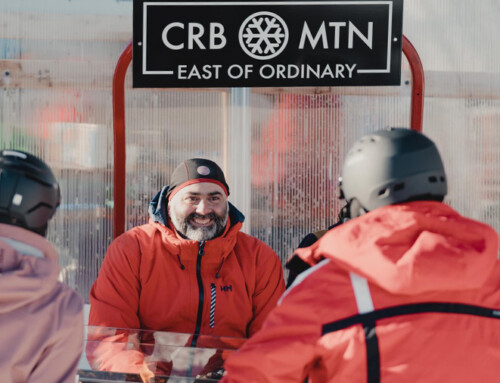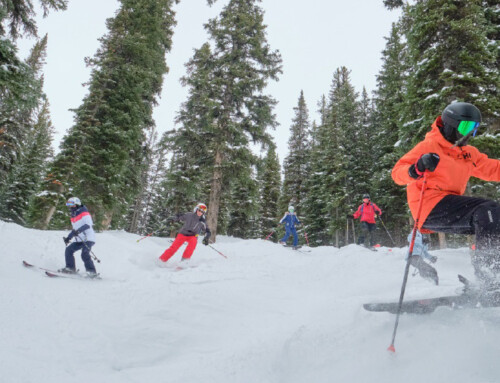The factors that make the ski and snowboard industry super fun and desirable also contribute to higher levels of mental health challenges for those who work within it. The significant changes and adaptations required throughout, and emerging from, the pandemic have also contributed to elevated stress and anxiety. In this session, Rebeckah shared some of the tools and tactics that have been implemented at Whitewater Ski Resort to create a supportive work environment where fostering good mental health is embedded as part of the corporate culture.
Key Takeaways
- We are managers of people with mental health – good mental health is just as important as physical health in creating a positive, productive work environment.
- The seasonal nature of the snow sports industry fosters conditions that can contribute to mental health issues.
- Gen Z’s, who represent the majority of guests and staff in the snow sports industry, are experiencing higher levels of anxiety and depression than previous generations.
- Leadership in any organization sets the stage for valuing and supporting mental health as an important part of corporate culture.
- Staff look to their managers to model behaviours that contribute positively to mental health. Checking in with your team, being empathetic and connecting staff to resources are all ways that managers can support mental health.
- “You can’t pour from an empty cup” – you need to take care of yourself first and ensure your mental health is good in order to support others.
- Conversation around mental health is more open and accepted today – as a society we are more aware of it and the impacts it has on work performance and safety.
Presentation Highlights
- Research shows that the snow sports industry has higher rates of mental health challenges for a variety of reasons:
- The escapism and party mentality of those who come to work in ski towns fosters higher levels of risky behaviour with respect to alcohol and drug consumption
- 82.9% of seasonally-employed individuals engage in risky alcohol consumption vs 58% in the general population
- 8.3% use drugs vs 2.8% in the general population
- Seasonal work makes it harder to create attachments and build community
- Ski towns often have more limited access to mental health resources
- Seasonal employees sometimes lack benefits that cover the cost of mental health services
- The higher cost of living in ski towns may necessitate having multiple jobs
- The escapism and party mentality of those who come to work in ski towns fosters higher levels of risky behaviour with respect to alcohol and drug consumption
- 69% of employed Gen Z and Millennial Canadians are struggling with anxiety and 59% are dealing with depression
- Your role as a leader is to manage yourself, recognize the impact you have on staff, be a role model, give people a reason to care about coming to work, connect staff to resources, provide challenge and offer choice.
For almost 70% of people, their manager has more impact on their mental health than their therapist or doctor – it’s equal to that of their partner. 70% of people would like their manager to do more to support mental health.
Whitewater’s Tactics to Address Mental Health
- Bring the mental health conversation into the culture
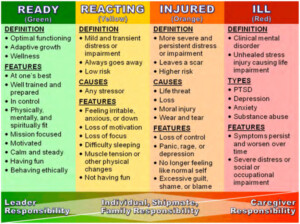
- Provide leadership training on the value and importance of mental health
- Create channels and tools to support staff at all levels
- Whitewater partnered with the snow safety team to train management to use the framework for mental health to check in with staff and understand where they are and create a common language throughout the organization about mental health
- Provide support and training for managers so they have tools and ways of supporting workers who are in the orange and red zones
- Brought in a ‘Fit For Snow’ trainer to teach staff how to be proactive vs reactive in managing their mental and physical health
- Mental health and wellness day: Empower supervisors to allow one of the five legislated BC sick days to be taken by a staff member as a mental health day.
- Created anonymous channels for reporting workplace issues such as bullying, harassment, etc.
- Created ‘Every Mind Matters’ program, guiding employees to external BC health resources.
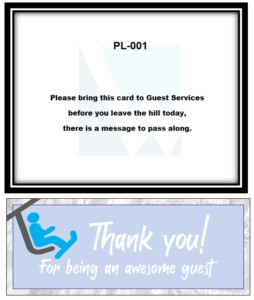
- Created a Disrespectful Guests and Amazing Guests Program
- Parking lot staff advise supervisor of guests who have been disrespectful and the supervisor delivers a card to the car windshield
- A manager meets with the guest to describe the situation and impact it had on the team
- Lets guests know they are being monitored for behaviour and lets staff know they are supported by management and don’t have to tolerate guest abuse
- Staff are given awesome guest cards to hand out as well to provide a positive element to the program
Participant Ideas, Actions, Inspirations and Challenges
Session participants were invited to share some of the initiatives they have undertaken along with the challenges and learnings they experienced. The following are highlights from the conversation:
- Mental health challenges have always been around, but there’s a sense that these challenges have been accelerating in recent years and exacerbated by the COVID pandemic.
- We are more aware now of how essential mental health is and how it contributes to good physical health, and hence work performance.
- There’s more openness to talk about mental health and more acceptance around taking a day off to deal with it. More people are actively seeking help – we need to be prepared with ways we can support.
- People want to work fewer hours now – not necessarily in a day, but over a week.
- Sunridge Ski Area hired more staff so they could offer a 4-day work week and ensure they had additional staff to cover when someone called in sick.
- Cultural shift is needed within organizations so that good mental health practices become part of the work environment – tools and resources need to be available to support staff both proactively and reactively.
- Manning Park is offering on-site medical services once a month, working with a mental health professional who comes out to speak to staff and is available in between for emergency support by phone. Also brought in a clinical nurse twice monthly, alleviating accessibility issues to medical care. The service offered was highly valued with the nurse fully booked when on-site.
- Promoting activities outside the ‘party scene’ has been an effective way to engage staff through other types of activities.
- Manning Park has coordinating outings – group hikes, overnight expeditions – and provides access to equipment for summer activities such as paddling.
- Whitewater implemented ‘rec nights’ where staff would vote what sport they would like to do and a gym was booked – staff would coordinate themselves for the activity.
- Grouse Mountain had a Strava challenge that encouraged staff to do a collective activity without having to necessarily do it at the same time.
- Grouse Mountain implemented a twice yearly staff survey to gather feedback that included insights on mental health, in addition to standard employee feedback.
- Supporting staff to be able to step away from abusive guests is critical – the guest is not always right and staff need to know that management is behind them.
Industry Topic Specialist
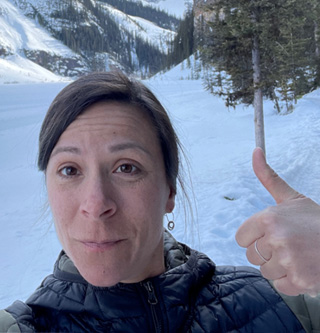
The Goldilocks amount of stress is key – where people are challenged but they don’t burn out. This point is different for each person and as a manager, you need to understand where that is for each of your staff.
Helpful Links
- Benefits Canada. (February 2, 2022). Survey shows majority of Gen Z dealing with anxiety, depression. Retrieved from https://www.benefitscanada.com/benefits/disability-management/majority-of-gen-z-millennials-dealing-with-anxiety-depression-survey/
- Brower, T. (Jan. 29, 2023). Managers have major impact on mental health: How to lead for wellbeing. Retrieved from https://www.forbes.com/sites/tracybrower/2023/01/29/managers-have-major-impact-on-mental-health-how-to-lead-for-wellbeing/?sh=21db0e682ec1
- McCarthy, M. (May 2022). Breaking Point. Retrieved from https://www.saminfo.com/archives/2020-2029/2022/item/165325-breaking-point
- Side Effects (video). https://www.youtube.com/watch?v=wN5BqCKO9DY&t=3s
- Canadian Ski Council. Physical and mental benefits of skiing. Retrieved from https://www.skicanada.org/physical-and-mental-benefits-of-skiing/
- Ski seasons and mental health: The good, the bad and the ugly. Retrieved from https://www.snowskool.com/blog/ski-seasons-and-mental-health-good-bad-ugly
Disclaimer: In providing your business with the information above and other support or advice, including information, support and/or advice relating to your business operations, Covid-19 recovery, The Canadian Ski Council, Tourism Café Canada, session sponsors and topic specialists are not responsible or liable for decisions made, strategies adopted or third party program results, and specifically disclaim any responsibility for any consequences, financial or otherwise, of a business relying on our advice or using information we provide. Companies must understand and agree that they are responsible for all actions they take and decisions they make and must do their due diligence and seek appropriate legal, accounting, tax, or other professional advice as they may require.





